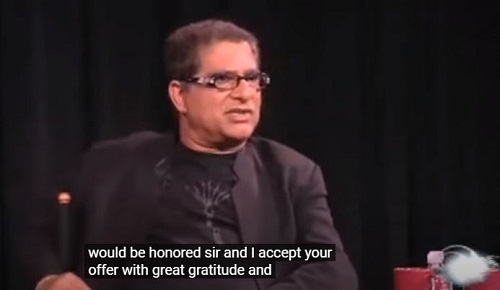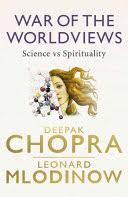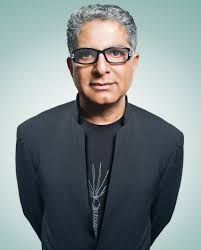TRANSLATE THIS ARTICLE
Integral World: Exploring Theories of Everything
An independent forum for a critical discussion of the integral philosophy of Ken Wilber
  Frank Visser, graduated as a psychologist of culture and religion, founded IntegralWorld in 1997. He worked as production manager for various publishing houses and as service manager for various internet companies and lives in Amsterdam. Books: Ken Wilber: Thought as Passion (SUNY, 2003), and The Corona Conspiracy: Combatting Disinformation about the Coronavirus (Kindle, 2020). Frank Visser, graduated as a psychologist of culture and religion, founded IntegralWorld in 1997. He worked as production manager for various publishing houses and as service manager for various internet companies and lives in Amsterdam. Books: Ken Wilber: Thought as Passion (SUNY, 2003), and The Corona Conspiracy: Combatting Disinformation about the Coronavirus (Kindle, 2020). Where Chopra Does a Better Job Than WilberComments on "War of the Worldviews"Frank Visser
None of these guys have changed their minds after this debate. That usually happens. Yet, having a debate can be meaningful.
During a conference called "Does God Have a Future?: The Great Debate", held at the California Institute of Technology in 2010, the panellists were, on the side of science, Sam Harris and Michael Shermer, and on the side of spirituality: Jean Houston and Deepak Chopra. As the YouTube description of the video reads: "Chopra and Houston contend that the universe is proof that intelligence is at the heart of creation and that a person needs to look beyond what can be seen and touched, while Shermer and Harris argue science and biology can explain what is happening to people when they pray, meditate and believe in God and that evolution can explain why our beliefs developed."
Chopra: “Is there a physicist in the audience to actually address this point?” (21:10)
‘I know what each of those words means, but...’As you will notice in this video, Chopra speaks with a very angry and defensive tone, when he argues louder and louder for a spiritual worldview, but that's perhaps because his two opponents think everything he says is woo-woo (a term coined by Shermer, meaning hooey. drivel. baloney). Not a very productive stance for starting a debate about such a highly contentious issue as the future of God, but hard to resist. At a certain moment, the discussion touched upon the topic of quantum physics (so dear to Chopra: his first book was Quantum Healing, 1989). During the Q&A session after the debates, Leonard Mlodinov rose from the audience to confront Chopra about his misunderstanding and misuse of terminology derived from quantum physics. Mlodinov is co-author of books with Stephen Hawking A Brief History of Time (1988) and The Grand Design (2010). So he would be exactly the right person to respond to Chopra. This is the hilarious dialogue between Mlodinov and Chopra that ensued (at 1:04:00): Guy with the mic (Q): What's your name? 
Chopra: “I would be honored sir and I accept your offer with great gratitude.”
In every way, this is a hopeless discussion. Chopra co-opts concepts from physics and gives them a different meaning. Mlodinov objects to such misuse. Chopra claims science is limited in its scope and needs to include consciousness as well. Mlodinov might agree with that assessment, but doesn't feel it is justified to imbue the concept of consciousness with spiritual meanings as Chopra usually does. 
However, the two gentlemen continued their exchanges after the conference, and this resulted in a book-length treatment of the topic, called War of the Worldviews: Science vs. Spirituality (2011). And this respectful discussion is far from a war! I have never been a great fan of Chopra, but by accepting Mlodinov's offer to educate him, he deserves respect. In this he does a better job than Wilber, who has never engaged my sustained criticism of his understanding of science (evolutionary theory and thermodynamics in particular). Instead, he has responded in a condescending, dismissive and even angry way and called me "extremely conventional". What a difference it would have made if he had been open to a lengthy exchange of ideas, over a longer period, so ideas could be clarified and elaborated upon. Wilber would frame this as a "cross-level debate", between two different levels of development. In A Theory of Everything (2001) he states: "This is why cross-level debates are rarely resolved, and all parties usually feel unheard and unappreciated." (p. 14). True, none of these guys have changed their minds after this debate. That usually happens. Yet, having a debate can be meaningful. It clarifies positions on both sides of the fence, and makes it easier for the reader to choose sides. Chopra could have made the argument: you can only understand my point if you are enlightened (assuming for the moment that Chopra is enlightened, or knows from experience what he is talking about). And that would be the end of the discussion. But Mlodinov correctly questions the conclusions Chopra draws from these experiences. And that's a reasonable objection as well. Do our spiritual experiences—of bliss, inner peace, joy—valuable as they are, tell us anything about the outside world of the cosmos, life, and everything? That is a challenge Wilber has not yet met. He freely concludes from his experiences that he has contacted or is even identical to SuperMind (or whatever phrase he wants to use), eternity, infinity, etc. Sam Harris, an experienced meditator, would never go that far, and warns explicitly against this metaphysical overreach of what can be known. Is it fair to compare Wilber to Chopra, since both are different types of mind? Wilber's theories are much more sophisticated than those of Chopra, but Chopra is more eager to "get even" with scientists and skeptics in the public arena. True, but there is a minimum of engagement with dissenting opinions needed to keep a philosophical system from degenerating into an ideology. The topics discussed in War of the Worldviews are:
On the backcover, Wilber praises the book as follows: "In War of the Worldviews, Deepak Chopra and Leonard Mlodinov have given us one of the most compelling, important and significant books written on the relation of science and spirituality in today's world." In many respects, Wilber would side with Chopra in this debate, so it is instructive to follow some of the arguments put forward by Chopra in support of a spiritual worldview, and the often sobering rebuttals by Mlodinov. putting subjectivity on a pedestal Deepak Chopra A large part of the discussion revolves around deep-sounding questions such as: is the universe conscious? is the universe alive? is the universe evolving? Now, these statements can only make sense when we change the meaning of "alive", "evolving", "conscious" so much that it no longer applies to our normal understanding of these terms. Normally something is alive when it breathes, shows metabolism, has a limited life span and begets offspring. The universe is not like that. Something evolves when it is part of populations, shows variations and in competition with same-species members for survival. The universe is not like that. Something is conscious when it is aware of itself and responding to stimuli in its environment. The universe is not like that. When it comes to the domain of life, the issue of design naturally pops up. It has been discussed since the days of Paley and Darwin, and is still debated today (between creationists and scientists). Creationists conclude from the appearance of design of various organs or processes (of the eye, the wing, the immune system, and many other organs or processes) that these actually are designed. Science accepts the appearance of design but explains it by naturalistic means. Things only look designed, but we have to go beyond appearances. Besides, the design-hypothesis can never actually flesh out the details about how the Designer has gone about designing (and producing, which is quite something else!) all things. By definition this theory is empty of content—Mlodinov uses the word "barren". Here's an argument from Mlodinov which I have used many, many times when reviewing Wilber's spiritual worldview. And I could not agree more: If scientists describe the universe through laws that act without purpose, it's not because we oppose an intentional universe; it's because we don't appear to live in one. It can be inspiring to believe the universe is evolving towards greater complexity and intelligence under the guidance of a universal consciousness. But for scientists, such musings are not where the investigation ends; they are where it begins. (p. 61-2) Chopra seems to start from the opposite end of things: spirituality can "explain" life, consciousness and such by postulating it has always been there from the very start of the universe. But is that really an explanation or begging the question big time? Spirituality doesn't need a miracle to explain life once the concept of a dead universe is discarded. What I want is to shed light, not make a case for magic. Far stronger is the argument that the universe gave rise to complex life because life has always existed, going back to the precreation state. (p. 81) To paraphrase Mlodinov, I understand all these words, but I still don't know... Here's another gem from Mlodinov: That such subjective experience [of joy] is important does not threaten the scientist. But the danger of putting subjectivity on a pedestal and uncritically accepting metaphysical speculation as truth is that one will miss out on the most important intellectual understanding we can achieve—that of knowing the real place humanity holds in the physical cosmos. To me, that too is part of the richness of life. (p. 90)  Leonard Mlodinov "Uncritically accepting metaphysical speculation", isn't that precisely what Wilber does by holding on to the Eastern-esoteric doctrine of involution and evolution? And by loading subjective mystical experiences with absolute and metaphysical meaning? A refrain Chopra will return to in the book is that by spiritual experiece we can contact "another realm of infinite possibilities", and thus lead a life of creativity, love and insight. Evolution too, the emergence of more and more complex and conscious beings, would best be explained by such a concept. But again, is this a real explanation? Can we explain the evolution of, say, the elephant, by postulating a "potential elephant" somewhere in this higher realm? If so, what part of the elephant is stored there, if not the complete blueprint of the elephant? Or only it's bare outline? Having a trunk? Big ears? This leads nowhere. Wilber's evolutionary cosmology leads to the same theoretical emptiness. To explain the complexity of the biological world around us, he postulates an "Eros in the Kosmos", a self-organizing "drive" towards complexity and consciousness. Rather, there is a force of self-organization built into the universe, and this force (or Eros by any name) is responsible for at least part of the emergence of complex forms that we see in evolution.[1] But what part of complexity and consciousness does this drive take care of? And what part is explained by mere naturalistic forces? And where do we draw the line? This is a fact-free, spiritually uplifting view of life, without any theoretical content or merits. The book covers many different subjects, but the major themes are clear: Chopra paints with a very broad brush, takes concepts from science and gives them his own preferred mystical meaning. Mlodinov proceeds cautiously and shuns grandiose ideas about enlightenment and special priviliged spiritual knowledge claims about the universe. Chopra rejects religion, Intelligent Design and creationist ideas, but claims that his "spirituality" has no such shortcomings. Mlodinov replies that Chopra runs into the same difficulties as his religious believers: he introduces explanations that in the end don't really explain anything. Towards a Secular spiritualityIt is perfectly possible to have a spirituality that doesn't fall into these metaphysical traps. Promoting a life of "pure consciousness", which shows the qualities of silence, peace, is self-sufficient and awake, is spontaneous and dynamic, blissful, knowing and whole (as Chopra lists these characteristics on p. 264-5), makes perfect sense within a secular worldview. It is not necessary to go beyond these experiential realities and claim special knowledge about how the cosmos and life emerged, or what the nature of God would be. Contrary to the spiritualist prejudice about science, science is open minded, concludes Mlodinov: Science is open-minded because it has no agenda. Science does not care if the Earth is center of the universe or just another planet, if the Milky Way is the only galaxy or just one of many billions, or even if our universe is not unique. Science does not take offence at finding that human beings developed from apes or bacteria, that we are gone to dust when we die, or that our consciousness has no magical side to it. (p. 296) I am not saying that science has all the answers. Consciousness lies at the heart of Deepak's worldview. It is also science's last frontier. (p. 298) Admittedly, our self-love makes it difficult to accept a worldview in which human beings don't play a central role in the universe. But science's ultimate triumph lies in the integrity of its methods, the openness of its point of view, the eagerness of its embrace of the truth. Science may never have all the answers, but it will never stop looking for them, and it will never take the easy way as it continues on its search for understanding. (p. 299) Chopra remains with his conviction that we should leave materialism behind, and embrace a spiritual view of the world and ourselves. I leave it to you to make a choice. I have declared repeatedly that I am not defending any conventional God. But spirituality cannot be artificially segregated from the essence of religion. Both depend on a personal journey, leading in the end to the transformation of consciousness. The invitation to begin such a journey comes from reality itself. I firmly believe that reality wants to be known, and human evolution answers to that call. Science is one answer, but it can't hog the road; spirituality is just as valid an answer. (p. 301) I know what each of those words means, but I still don't think I know... NOTES[1] Ken Wilber, "Re: Some Criticisms of My Understanding of Evolution", www.kenwilber.com, December 04, 2007.
Comment Form is loading comments...
|